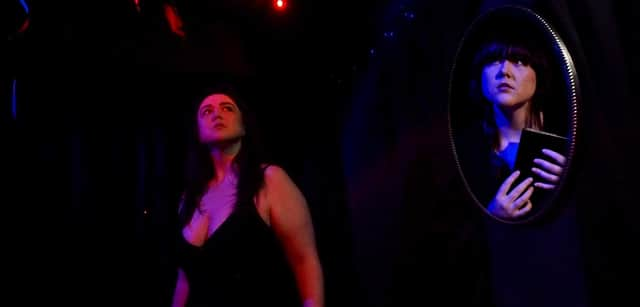Ithaca: an epic journey through one person's head
This article contains affiliate links. We may earn a small commission on items purchased through this article, but that does not affect our editorial judgement.


This week I watched Ithaca by Phoebe Angeni, and the experience reinforced the strangeness of this year’s festival. Ithaca is an archetypal Fringe show in lots of ways – a deeply personal, solo, contemporary adaptation of a classic text (in this case Homer’s Odyssey), performed in a small black box space, on the kind of minimal set you can dismantle in five minutes.
It’s such a familiar set-up that I couldn’t help thinking of Annie Griffin’s 2005 comedy, Festival, in which a character called Faith arrives in Edinburgh, full of soon to be dashed hope, to do an over-earnest one-woman show about her literary obsession, Dorothy Wordsworth. I am not here to mock, though. Ithaca is a good show, worth your time – the Scotsman’s Joyce McMillan gave it four stars last week, calling it “as moving and courageous as it is impressive”.
Advertisement
Hide AdI wanted to write about Ithaca for two reasons. The first is the oddness of watching something like this on a laptop at home. Angeni isn’t in Edinburgh, as far as I know; Ithaca’s Fringe premiere is via a pre-recorded film, available online, on demand, via Fringe Player. It is competing for your attention not with other solo Fringe shows but with absolutely everything available on TV and the internet.
I’m conflicted about this. On the one hand, it doesn’t quite work. Watching a solo show in a black box theatre space, you commit yourself to spending an uninterrupted hour in the company of someone who is making themselves vulnerable in order to share something important. The point is empathy and connection, in real time and in a real, intimate space. Patience is required and will hopefully be rewarded. Online, my overstimulated mind began to drift the moment I realised all 60 minutes of film would be in the same small, black curtained room (albeit with a few filmic rather than theatrical visual effects). I kept listening but wandered around, looked for something to eat, fed the cats, wondered what was on Netflix.
On the other hand, perhaps Ithaca is even more contemporary for being presented in this way. Vloggers on YouTube also share insecurities from one room, at length, straight to camera. Towards the end of the show Angeni delivers a brilliant, frustrated diatribe about how, in stories, “fat people are never the love interest and they’re never changing the world”; if it was a Twitter thread I could see it going viral.
The other reason I wanted to write about Ithaca is that it’s one of the only Fringe shows I’m aware of this year that directly addresses mental health. When I’m not editing the Scotsman’s Edinburgh festivals coverage I work for the Mental Health Foundation, and back in 2017 I founded a new Fringe prize called the Mental Health Fringe Award. Around 2015 we had noticed a huge rise in the number of mental health themed Fringe shows. When we set up the award we were flooded with emails from performers wanting to be considered; our first long-list had over 60 shows. By 2018, mental health shows were so prominent at the Fringe that they generated a lengthy report in the New York Times.
This year there appear to be virtually none, online or off, in the wake of a pandemic that has had a profound impact on people’s mental health globally. Ironically, this might explain the absence. Shows about mental health tend to be created by people already in recovery – they are too exposing otherwise – and at this point perhaps we are all still processing the impact lockdown has had on our lives, or are just desperate to look outwards rather than in. Ithaca is a notable exception, but is resonant after a year and a half of lockdown: a reimagining of a famous epic journey that confines it to one small space and the contents of one person’s head.
A message from the Editor
Thank you for reading this article. We're more reliant on your support than ever as the shift in consumer habits brought about by coronavirus impacts our advertisers.
If you haven't already, please consider supporting our trusted, fact-checked journalism by taking out a digital subscription at https://www.scotsman.com/subscriptions